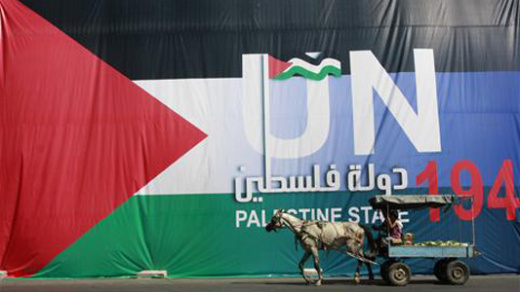- About
- News
-
Advocacy
- Accountability & Litigation
- International Advocacy
- National Advocacy
- Documentation
- FAI Unit
- Al-Haq Publications
- Library


- About
- News
-
Advocacy
- Accountability & Litigation
- International Advocacy
- National Advocacy
- Documentation
- FAI Unit
- Al-Haq Publications
- Library

![A Palestinian vegetable vendor rides a horsecart past a banner in Hebron supporting the country’s bid for statehood. [Photo Credit: Nassar Shiyoukhi / AP] un-membership-palestine](/cached_uploads/resize/400/200/alhaq_files/images/stories/Images/2012/un-membership-palestine.jpg) As a human rights organisation dedicated to the promotion and protection of human rights in the Occupied Palestinian Territory (OPT), Al-Haq welcomes the likely upgrade of Palestine to UN ‘Observer State’ status as an occasion where the right of the Palestinian people to self-determination can be reaffirmed.
As a human rights organisation dedicated to the promotion and protection of human rights in the Occupied Palestinian Territory (OPT), Al-Haq welcomes the likely upgrade of Palestine to UN ‘Observer State’ status as an occasion where the right of the Palestinian people to self-determination can be reaffirmed.
Throughout 45 years of occupation, Israel has exploited the imbalance of power between the occupied and the occupier to create ‘facts on the ground,' with the intention that they would lead to the retention of settlements and their associated infrastructure. These settlements amount to the illegal annexation of territory, and fragment the West Bank, including East Jerusalem, into isolated geographical units. Coupled with the harsh restrictions on freedom of movement between the West Bank and the Gaza Strip, and the illegal regime of closures imposed on the latter, these policies have severely undermined the meaningful exercise of the Palestinian people’s right to self-determination by limiting the possibility of contiguous territory and the ability to freely dispose of natural resources, both of which are essential to the effective fulfillment and enjoyment of such a fundamental right. Recognised as a peremptory norm of international law, violations of the right to self-determination trigger Third State responsibility.
Since 1967 initiatives founded on international law have been sidelined to facilitate political processes, including negotiations. This has resulted in the deterioration of the human rights situation of the Palestinian population through the continuous perpetuation of Israel’s violations of international law. The UN initiative is an opportunity to break from this past, but this can only be accomplished by placing international law at the core of the General Assembly resolution upgrading Palestine’s status.
On 29 November, the status of Palestine will likely be enhanced to an ‘Observer State.’ At this crucial moment, Al-Haq calls on the Palestine Liberation Organisation to guarantee that the General Assembly resolution:
- does not in any way premise the legitimate demands of the Palestinian people to dignity, territorial sovereignty and self-determination on political considerations;
- reiterates the Palestinian people’s right to self-determination, including the right of return, which is part and parcel of the right to self-determination, as well as Palestinians’ sovereignty over natural resources in the OPT;
- avoids the insertion of clauses in the resolution that condition Israeli compliance with international law on the proceedings of bilateral negotiations;
- emphasises the territorial unity of Palestine, based on the pre-1967 borders, namely the West Bank, including East Jerusalem, and the Gaza Strip;
- steers clear of the imminent risks associated with providing room in the text of the resolution for land swap agreements. Land swap agreements concluded under occupation constitute a violation of international law in favour of a purely political solution. Such agreements would also reward Israel's illegal policy of dispossession and land appropriation for the purposes of settlement construction and expansion;
- follows the practice of keeping Security Council and General Assembly resolutions pertaining to status upgrades within the United Nations system brief and concise. Lengthy resolutions increase the likelihood of misinterpretation and manipulation;
- avoids referencing diplomatic or political initiatives that are outside of the realm of international law and which may undermine the rights of Palestinians, such as the Arab Peace Initiative and Quartet statements;
- highlights that the decision to accord to Palestine ‘Observer State’ status in the United Nations system does not prejudice the acquired rights, privileges and role of the Palestine Liberation Organisation as the sole and legitimate representative of the Palestinian people as a whole;
The enhancement of Palestine’s international legal personality within the United Nations is not an exercise of any right, but a means to advance existing claims to rights. By acquiring access to international mechanisms, Palestinians will gain the political and legal framework to pressure the international community to comply with its obligation to bring Israel’s serious breaches of peremptory norms to an end. Under such a strengthened position within the international legal system, the State of Palestine will be allowed to formally accede to international human rights instruments and other technical United Nations bodies, thus improving protection of Palestinian rights at the domestic and international level.
At this significant juncture in the history of the Palestinian people’s struggle to exercise their inalienable right to self-determination, Al-Haq calls on the Palestine Liberation Organisation to learn the lessons of the Oslo Accords, which overlooked international law, and thereby allowed for the proliferation of violations. The fundamental rights of the Palestinian people are matters of binding international law. Their implementation must be established as the foundation of any measure to achieve a just and durable solution to the conflict.